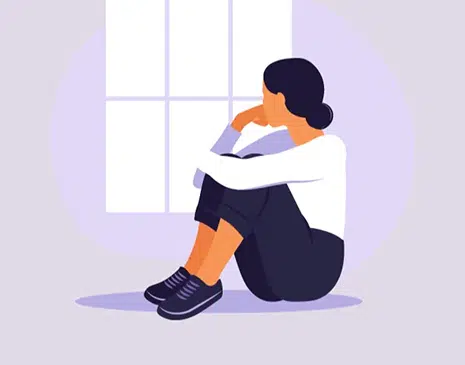If we were to sum up the overall feeling of 2021, most of us could either let out a giant sigh or just say BLEH. The monotonous life of waking up, working from home, staying home and not seeing an end in sight.
It’s not burnout because you still have energy, and it’s not depression because you don’t feel hopeless. You just feel somewhat joyless and aimless. It turns out there’s a name for that: languishing.
So, could you be a contender for the mood of 2021 and what can you do to beat it? Read on.
What exactly is languishing?
Languishing is a sense of stagnation and emptiness, like ‘no-man’s-land’. It feels as if you’re JUST getting through your days, looking at your life through a foggy windshield.
In psychology, we think about mental health on a spectrum from depression to flourishing. Flourishing is the peak of well-being: You have a strong sense of meaning, mastery and mattering to others. Depression is the valley of ill-being: You feel despondent, drained and worthless.
Languishing is the Jan from the Brady Bunch of mental health. It’s the space between depression and flourishing — the absence of well-being. You don’t have symptoms of mental illness, but you’re far from flourishing. You’re not functioning at full capacity. Languishing dulls your motivation, disrupts your ability to focus, and triples the odds that you’ll cut back on work. It appears to be more common than major depression — and in some ways it may be a bigger risk factor for mental illness. Those with a history of depression and anxiety are also more prone to languishing than others as well as extroverts.
Signs you might be languishing
Not everyone who is languishing will experience it in the same way or with the same intensity.
Languishing will affect some of your decisions, behaviours, and emotions toward yourself, others, and the world.
Languishing can look like declining invites to activities you would normally enjoy. You may not feel strongly about not going, but you might not see why going would be any better than sitting at home.
For someone else, languishing may mean attending the event only to leave early because it brought them no enjoyment.
Other possible signs of languishing may include:
- moods that are not too high or too low (you’re not happy but you wouldn’t say you’re sad either)
- unmotivated more often than usual
- unsettled but not highly anxious
- struggling to focus on tasks, especially some days more than others
- feeling detached from life, tasks, or people but not experiencing negative emotions toward them
- indifference toward life and difficulty getting excited about anything
- fatigue and burnout
- loss of interest in passions and hobbies
- feelings of stagnation
- feeling disconnected from your purpose in life
Difference between depression, anxiety, and languishing
As explained earlier, languishing is not the same as depression or anxiety. These are mental health conditions that can be diagnosed and treated by healthcare professionals.
If you’re living with depression, you’re likely experiencing feelings of extreme sadness or despair, like you’re stuck in a hole, and you can’t get out. You may contemplate self-harm or be self-critical. Some of your cognitive functions, like memory, may also be compromised when you have depression.
Languishing isn’t sadness either. While you may feel “down,” you aren’t sad. Instead, some people may refer to this as that ‘bleh’ — where you aren’t happy or sad, just not quite your usual self.
Similarly, anxiety disorders often come with intrusive thoughts of worry or fear. You may feel restless or on edge. You also may overthink situations and let thoughts grow out of proportion.
With languishing, you may have moments of anxiety or worry, but these are natural responses to everyday stress. These feelings don’t linger and they’re not your permanent state of mind.
If you feel you’re experiencing symptoms beyond languishing, consider speaking with a mental health professional or your doctor.
How to cope with languishing
- Accept that some things are out of your control – Living with lockdowns and restrictions can be frustrating but the quicker you accept that it’s a situation you cannot control, the better off you’ll be.
- Take time off when possible – It can feel counterintuitive and counterproductive but once burnout or lack of motivation sets in, it’s time to stop and take a real break. This might mean several days off or disconnecting from most things for a weekend if that’s all you have. Step away from the devices, social media and computer.
- Give yourself permission to enjoy – Instead of focusing on what “should” make you happy or not trying to find it at all, lean into anything that brings you enjoyment. As long as it’s not dangerous, it’s worth exploring.
- Change your scenery – When working from home, create a designated area to work separate from where you relax. Take walks in your neighbourhood different to a way you may usually walk, try and get outside where you can.
- Talk to someone – Medicare offers a mental health treatment plan that lets you claim up to 20 sessions with a mental health professional each calendar year. You can learn more about it here
- Get vaccinated – one way we can be closer to coming out of this is to get vaccinated. The aim for the country is 80%.
Final thoughts…
If it sounds like you’re languishing, you are far from alone. It is a product of the uncertainty and limits brought on by the COVID-19 pandemic and has specific coping mechanisms. Little by little, the pandemic will end and the added distress it brought will disperse with it. In the meantime, follow the above, connect with friends and family and share your feelings.
Remember, don’t go it alone. Please reach out for help.
Lifeline: 13 11 14 or lifeline.org.au
Beyond Blue: 1300 22 4636 or beyondblue.org.au
Kids Helpline: 1800 55 1800 or kidshelpline.com.au
Headspace: 1800 650 890 or headspace.org.au













